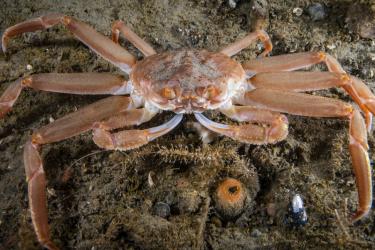In 2017, there were 5,764 confirmed cetacean (dolphin, porpoise, and whale) and pinniped (seal and sea lion) strandings in the United States. A marine mammal is considered stranded if it meets one of the following criteria:
- Dead, whether on the beach or floating in the water;
- Alive on a beach but unable to return to the water;
- Alive on a beach and in need of apparent medical attention; or
- Alive in the water and unable to return to its natural habitat without assistance.
Marine mammals strand for a variety of reasons. Results from examinations and necropsies (animal autopsies) show common causes of strandings include disease, fishery entanglements, harmful algal blooms and associated biotoxins, injuries due to vessel collisions or human interactions such as gunshots, malnutrition, marine debris, parasite infection, pollution exposure, or some combination of these factors. Some strandings may also be related to unusual weather or oceanographic events. Additionally, in many cases the cause of stranding remains undetermined.
Every marine mammal stranding event is unique and poses different challenges. Organized stranding response by highly trained and authorized personnel best serves the well-being of the stranded animals, and helps manage risks to public health and safety. The U.S. Marine Mammal Stranding Response Network (National Stranding Network) is comprised of more than 100 organizations that provide first response capabilities for cetaceans and pinnipeds (except walrus) that are sick, injured, in distress, or dead. Data collected from stranded and rehabilitated marine mammals provides valuable information on the biology, physiology, and disease risks of those species, and the lessons learned with species from stable populations can greatly help conservation of threatened or endangered species. For some species, the only information available about its biology and natural history has been gained from stranded specimens. Data collected from live or dead stranded animals can also provide important information regarding human impacts on marine mammals such as interactions between marine mammals and fisheries, vessels, marine debris, or the effects of pollution (oil spills, contaminants, and heavy metals).
This report provides an overview of marine mammal stranding activities in the United States for calendar year 2017. Reports for calendar year 2018, and more recent data, are planned and will be available in the future.
How to Report a Stranded Marine Mammal
If you come across a stranded marine mammal remain a safe and legal distance from the animal. Please report the animal your regional 24/7 hotline (West Coast 1-866-767-6114; Greater Atlantic 1-866-755-6622; Southeast 1-877-942-5343; Alaska 1-877-925-7773; Pacific Islands 1-888-256-9840). The most important information to collect is the date, location of stranding (including latitude and longitude), number of animals, whether the animal is alive or dead, and species, if known. You can also download the Dolphin and Whale 911 Stranding App in the Apple Store to help report a stranding.



